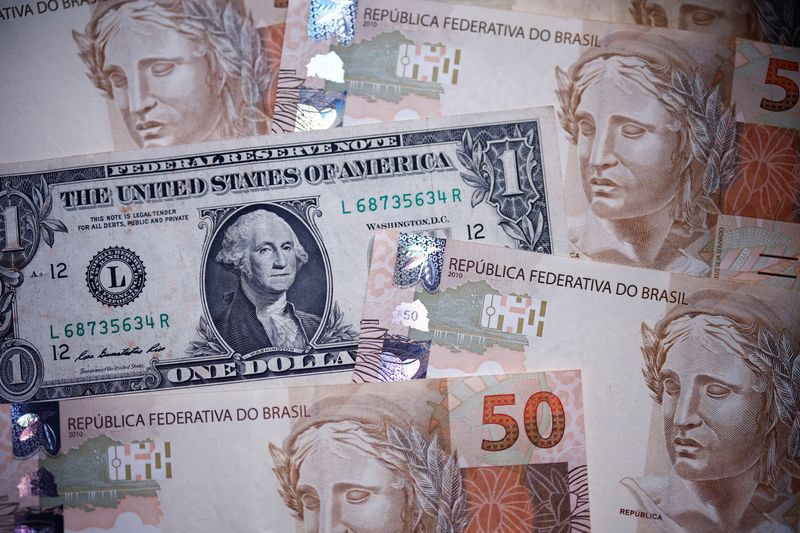By Rodrigo Campos and Karin Strohecker
NEW YORK/LONDON (Reuters) -Brazil’s real tumbled by the most in over two years to a fresh record low on Wednesday and stocks were also under pressure as financial markets put the Brazilian government’s spending plans and wide budget deficit to the test.
The local currency hit 6.3139 per dollar, taking the yearly decline near 23%. The currency closed for trading locally at 6.26, down 2.7%, while it continued to weaken in offshore trading. It was on track to post the largest daily decline since April 2022.
Further weighing on the real late in the session, the U.S. Federal Reserve cut interest rates on Wednesday and signalled it will slow the pace at which borrowing costs fall, strengthening the dollar across the board.
The benchmark Bovespa stock index was down 2.6% on the day to a six-month low and the cost of insuring exposure to the country’s bond debt was at a 14-month high, with investors anxious as Latin America’s largest economy faces a deepening financial market crisis.
Investors have been doubtful whether lawmakers will be able to pass the main part of a fiscal bill aimed at putting government finances on a more sustainable footing.
“Markets are mainly worried about the overall fragile fiscal trajectory and the fact that it is affecting inflation expectations via the pressure on the real,” said Thomas Haugaard, portfolio manager at Janus Henderson in Copenhagen.
“Often we have to see the market revolting before painful adjustments come, but for now it does not look like there will be a fiscal response to the recent turmoil.”
Congress late on Tuesday approved the main text of a bill but has yet to vote on some amendments proposed by lawmakers, while Finance Minister Fernando Haddad said Wednesday the Senate is ready to vote the bill as soon as Congress sends it.
“We are doing our part: sending (Congress) the measures, working to make sure they are not watered down, and convincing people these measures are needed to strengthen the fiscal framework,” Haddad said.
Brazil’s central bank held spot U.S. dollar auctions for the third consecutive session on Tuesday and reaffirmed its tough monetary policy stance.
“The central bank hiked more than expected and have been intervening in the currency so they are doing their part,” said Shamaila Khan, head of fixed income for emerging markets and Asia Pacific at UBS Asset Management.
The local sovereign bond benchmark yield hovered near 14.7% on Wednesday, having on Tuesday hit 14.847%, the highest since March 2016. The yield started the year around 10.5%.
“At this point the bar is very, very low for a positive fiscal surprise,” said Arif Joshi, co-head of the emerging markets debt platform at Lazard (NYSE:LAZ) Asset Management.
He said fiscal consolidation must move beyond bets that stronger growth will make the fiscal side look healthier and into actual spending cuts.
“It always starts with baby steps and it builds from there,” Joshi said. “We’re not looking for the full bazooka, we’re looking for baby steps in the right direction.”
Five-year credit default swaps, the cost to insure against a sovereign default, stood at 194 basis points according to S&P Global Market Intelligence -the most expensive since October 2023.
The dollar-denominated MSCI Brazil index has fallen more than 30% since the start of the year.
Brazil’s nominal budget deficit, including interest payments on public debt, has climbed to 9.5% of GDP from 4.6% when President Luiz Inacio Lula da Silva took office in January 2023.



